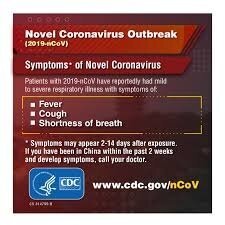Frontline Blog
Local Leaders Start Scaling Up the Public Health Response to Coronavirus
January 2020
By Chrissie Juliano, MPP, Executive Director, Big Cities Health Coalition

With the CDC’s confirmation of the first local transmission of Coronavirus in the U.S. today, it’s important to know that the entire health system, from trained public health experts to medical professionals across the country, is working at levels of government across the public and private sectors to keep Americans healthy and safe.
With just six confirmed cases in the U.S. so far, public health officials continue to stress that the risk to the American public is low. While it remains to be seen how many cases will occur in our communities, the takeaway message is: this is public health in action.
“Every part of our national and local health system is built to prevent outbreaks and respond to them,” said Monica Valdes Lupi, a de Beaumont Senior Fellow and former Executive Director of the Boston Public Health Commission. “Having been ‘in the seat,’ I know that this includes not only screening passengers who are coming from China, but also keeping track of local contacts who might have been exposed and monitoring their health. It means thinking beyond clinical care for people under investigation of possibly having the disease and considering how they should be housed and fed, and providing support for their families and loved ones.”
The work of public health professionals also includes helping those either infected or exposed to figure out how they will continue to support their families, if, for example, they don’t have appropriate sick leave. (See what Kansas City has done in this regard, featured in The Atlantic last year.) Public health professionals on the frontline help to make sure those caring for the ill (or potentially ill) have appropriate personal protective gear and the information that they and their staff need to share with patients. In many communities, the mayor (or local elected officials) will stand next to the local health director to share information with the public on what they need to do to protect them and their families.
Likewise, as I write this, local health officials are dusting off their emergency plans and staffing up their incident command structures so that are ready to act immediately if their jurisdiction has a case of Coronavirus.
Our members – big city health departments – serve huge swaths of people and are often first to see cases, because they are home to international airports and diverse, multicultural populations. They are also sometimes called on to support other local or state health departments. Despite years of underfunding and a shrinking workforce, they have a wealth of knowledge and capacity that is needed at times like this.
In public health, we refer to applying an “all hazards” response to these types of events. We train for them, we drill for them, and after the response, we help communities recover. Hopefully, Coronavirus will mostly be a drill for most of our communities and an opportunity to prepare for the next outbreak or natural disaster. In the meantime, you can be sure that your community is protected by your local and state health departments.
In addition to common-sense activities like hand-washing and covering your cough, there is another thing you can do. If you haven’t yet gotten your flu shot, you should do that now. At this point you’re far more likely to get the flu than Coronavirus. And at the peak of this flu season, the country has seen approximately 20 million cases, and there will be thousands of deaths.
For more information, check out the Centers for Disease Control and Prevention’s website on Coronavirus and the flu.